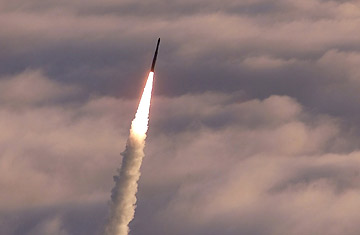
An unarmed Minuteman II intercontinental ballistic missile launches from Vandenberg Air Force Base in California
The Air Force announced Tuesday that it had mistakenly shipped parts for nuclear missiles to Taiwan, and promptly ordered up yet another investigation into its stewardship of the nation's atomic weaponry. The decision highlights how a relatively small screw-up involving — even tangentially — nuclear weapons can generate dangerous geopolitical fallout. President Bush was alerted to what the Pentagon called the "misshipment" within hours of Defense Secretary Robert Gates learning of it last Friday morning.
Air Force Secretary Michael Wynne told reporters that "four non-nuclear nose cone assemblies and their associated electrical components" had been mistakenly shipped to Taiwan, instead of the helicopter batteries Taipei had ordered. The shipped devices, Pentagon officials say, were key components for detonating a nuclear warhead mounted on a 1960s-era Minuteman missile (by alerting the warhead it was close enough to its target to begin its "detonation sequence"). Absent a nuclear warhead, however, they pose no threat. For reasons yet unknown, the parts were shipped from a Wyoming Air Force base to a Pentagon supply depot in Utah in early 2005, and then on to Taiwan in late 2006, where they were put into storage until recently. "Upon learning of the error, the U.S. government took immediate action to acquire positive control of the components and arranged for their safe and secure recovery to the United States," Wynne said. "These items have now been safely returned to the United States."
But the error marks a second major nuclear embarrassment for the Air Force, which last August mistakenly flew six nuclear-tipped missiles under the wing of a B-52 from North Dakota to Louisiana. Even though the warheads were not armed — and couldn't detonate, even if the plane had crashed — the notion of nukes going missing stoked fears of less-then-scrupulous oversight. That perception was confirmed in February, when a Defense Science Board study found that, in the post Cold War world, nuclear weapons are no longer accorded the oversight they once compelled by dint of their sheer destructive power.
Larry Welch, a retired Air Force chief of staff, told the Senate Armed Services Committee that such a laissez-faire approached has existed for years — and not just in the service he once headed. Since 1992, a Defense Science Board task force on nuclear-weapons security has repeatedly cited shortfalls, which were corrected, only to recur like the tides. "In each case the deficiencies were addressed, corrective actions were implemented but they didn't endure, they didn't last, and over time attention faded away and then we encountered a new set of deficiencies," Welch said. Beyond that, he added, "We found this change in the level of focus on the nuclear enterprise to be department-wide" and not merely an Air Force issue. It appears, Pentagon officials said, that the Defense Logistics Agency may bear more responsibility than the Air Force for the misshipped missile parts; Gates has ordered an inquiry into the details.
China objects to U.S. arms sales to Taiwan because Beijing insists Taiwan is simply a renegade province of the Peoples' Republic. Although U.S. policy accepts the principle that Taiwan and China are part of the same territory, it continues to supply arms to Taiwan to protect itself from any attempt at forcible reunification. "Our policy on Taiwan arms sales has not changed," Pentagon policy deputy Ryan Henry said Tuesday. "This specific incident was an error in process only and is not indicative of our policies, which remain unchanged."
Having warned that it will take military action to thwart any move to declare independence for Taiwan, Beijing now has "a bristling number of surface-to-surface missiles across the Strait of Taiwan," Admiral Timothy Keating, head of the U.S. Pacific Command, said in January. "It's measured in hundreds."
Beyond the questions the shipment has raised about U.S. nuclear security and China policy is whether or not it violated the Missile Technology Control Regime. That's a self-enforcing, 20-year-old agreement among nations seeking to halt the flow of missile components overseas. "That's under analysis now," Henry said. "If there was something that was amiss, it clearly was not intentional."
